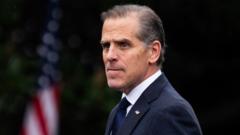The revocation of security clearances for 37 US intelligence officials by Tulsi Gabbard has sparked controversy, as accusations of politicization and partisanship emerge. Gabbard's memo reflects Trump's ongoing critique of the intelligence community, amid claims of undermining electoral success and possible distractions from other issues.
Tulsi Gabbard Targets Intelligence Officials: Security Clearances Revoked in Political Fallout

Tulsi Gabbard Targets Intelligence Officials: Security Clearances Revoked in Political Fallout
In a controversial move, Tulsi Gabbard, under Donald Trump's direction, revokes security clearances of 37 intelligence officials, igniting political debate and accusations of partisan maneuvers.
In a bold and contentious directive, Tulsi Gabbard, the Director of National Intelligence, has revoked the security clearances of 37 current and former U.S. intelligence officials, claiming they have politicized intelligence to serve personal or partisan agendas. This decision, revealed in a memo shared on social media, reportedly stems from orders by President Donald Trump himself. Among those affected are several national security veterans who previously served under Democratic administrations, including Presidents Joe Biden and Barack Obama.
Gabbard failed to provide substantiated evidence to back her claims in the memo. Security clearances are crucial for accessing sensitive government materials, with some former officials retaining them to assist in the transition for successors. Investigations are underway to determine whether all included individuals still held active clearances.
In her memo, Gabbard asserted that the revocation was necessary due to abuses of public trust, including alleged unauthorized leaking of classified information and severe breaches of tradecraft standards. "Being entrusted with a security clearance is a privilege, not a right," she emphasized on X, calling out those within the Intelligence Community for purportedly prioritizing their interests over the security of Americans.
The Trump administration has previously revoked clearances of key figures, such as Biden and Vice President Kamala Harris, amid ongoing investigations into the events surrounding the January 6 Capitol riot. Gabbard has recently focused her criticism on intelligence officials involved in the 2016 election interference assessments, which have been labeled as "treasonous conspiracies" by Trump and Gabbard to disparage his electoral victories.
Such moves have drawn ire from Democratic representatives, with critics viewing these allegations as mere distractions aimed at shifting attention from unpopular policies and Trump's controversial connections to figures like Jeffrey Epstein. A spokesman for Obama dismissed the claims as "ridiculous" and indicative of weak attempts at deflection in the political arena. As the political landscape continues to shift, the implications of Gabbard's actions may reverberate widely across American intelligence and governance.





















